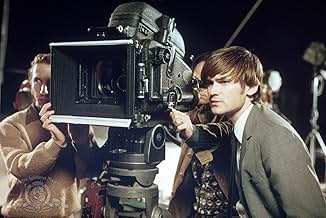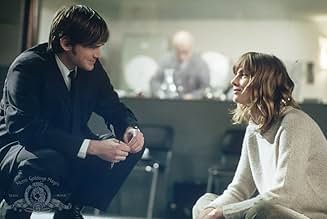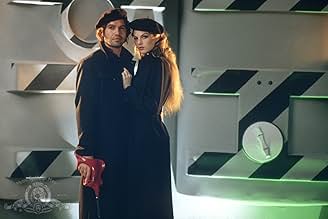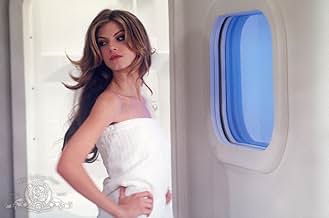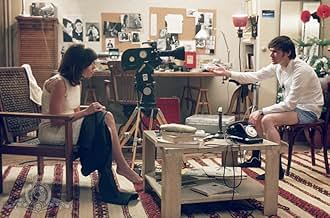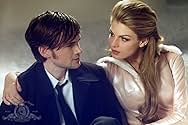CALIFICACIÓN DE IMDb
6.2/10
5.1 k
TU CALIFICACIÓN
Un joven cineasta hace malabares con la dirección de una cursi película de ciencia ficción, mientras se enfrenta a la relación con su novia que se desmorona.Un joven cineasta hace malabares con la dirección de una cursi película de ciencia ficción, mientras se enfrenta a la relación con su novia que se desmorona.Un joven cineasta hace malabares con la dirección de una cursi película de ciencia ficción, mientras se enfrenta a la relación con su novia que se desmorona.
- Premios
- 1 nominación en total
- Dirección
- Guionista
- Todo el elenco y el equipo
- Producción, taquilla y más en IMDbPro
Argumento
¿Sabías que…?
- TriviaAfter being fired, Andrezej puts his fist through the screening room door. This is a reference to Francis Ford Coppola (father of director Roman Coppola) and his short temper. When the editors get a framed section of the destroyed wall, it is actually a portion of a wall the elder Coppola wrecked in his early directing days.
- ErroresIn the tunnel, when Dragonfly swerves in reverse, there already are skid marks on the ground along the path taken by the car's tires.
- ConexionesFeatured in On the Set of 'CQ' (2002)
- Bandas sonorasCe Soir, Je Vais Boire
Lyrics by Gilles Thibaut
Music by Bruno Canfora
Performed by Claude François
Courtesy of Universal International Music, B.V.
Under license from Universal Music Enterprises
Opinión destacada
Despite the pedigree of being made by the latest Coppola clan member to enter the feature film directorial ranks, CQ came and went from theaters when it was released a few years go. Seeing it for the first time on Reel 13 on Saturday, I'm a little stunned as to why. Roman Coppola proves to be a promising, thoughtful filmmaker and as adept a student of cinema history as his Uncle Francis. CQ is an engaging, if loosely structured movie, managing to be simultaneously inventive and derivative, borrowing from and paying homage to everything from La Dolce Vita to the Marx Brothers.
Its primary source of influence is, of course, 1968's Barbarella, here thinly veiled as the fictional "Dragonfly", as the film within the film. CQ is about how Paul, a young editor (Jeremy Davies), working on said "Dragonfly" deals with balancing his career and his relationship as he works on both the big-budget sci-fi epic and directing his own personal documentary film. This set-up provides Coppola with three different planes of action going on – real life, the black and white documentary and the colorful, sexy, futuristic world of "Dragonfly". The fun really begins when Coppola deftly uses these formats to blur the lines of fantasy and reality when Paul, in his search for himself, begins to lose sight of where the boundaries for each of these worlds lie – or if they even exist.
In addition to Coppola's stellar usage of mixed media, the other key to CQ's success is Jeremy Davies, an extremely talented and severely underused young actor who quite possibly should have won an Oscar for his work in Saving Private Ryan and at least should have been nominated for last year's Rescue Dawn. I think there are less roles for him because he seems to insist on making quirky, out-of-the-box choices. However, when a director with vision is willing to roll the dice on him, he almost always delivers an inspired performance. CQ is no exception as Davies brings a believable, uncomfortable edge to Paul. He is a character who is lost and confused, but most actors would play him with a modicum of swagger. Davies makes him neurotic without being nebbish – as if still a boy in the body a man who isn't quite sure that he wants to grow up. At the heart of Davies' performance, however, still is that extra element of quirkiness that is all his own. It's that extra layer of thought he puts in to his performance and those unusual choices he makes that allows the character to feel fresh – different than what we're used to while at the same time, wholly plausible.
After all is said and done, with all its layers of meaning and different milieus represented within it, CQ ultimately becomes a dissertation on film and the nature of filmmaking as an artform. It depicts the tendency of the artist to lose himself in his work and how said artist can learn to manipulate the art to find his way again (it's no wonder I liked it so much). In that sense, it's a beautifully realized film and another highly auspicious debut from an almost unfairly talented family.
Its primary source of influence is, of course, 1968's Barbarella, here thinly veiled as the fictional "Dragonfly", as the film within the film. CQ is about how Paul, a young editor (Jeremy Davies), working on said "Dragonfly" deals with balancing his career and his relationship as he works on both the big-budget sci-fi epic and directing his own personal documentary film. This set-up provides Coppola with three different planes of action going on – real life, the black and white documentary and the colorful, sexy, futuristic world of "Dragonfly". The fun really begins when Coppola deftly uses these formats to blur the lines of fantasy and reality when Paul, in his search for himself, begins to lose sight of where the boundaries for each of these worlds lie – or if they even exist.
In addition to Coppola's stellar usage of mixed media, the other key to CQ's success is Jeremy Davies, an extremely talented and severely underused young actor who quite possibly should have won an Oscar for his work in Saving Private Ryan and at least should have been nominated for last year's Rescue Dawn. I think there are less roles for him because he seems to insist on making quirky, out-of-the-box choices. However, when a director with vision is willing to roll the dice on him, he almost always delivers an inspired performance. CQ is no exception as Davies brings a believable, uncomfortable edge to Paul. He is a character who is lost and confused, but most actors would play him with a modicum of swagger. Davies makes him neurotic without being nebbish – as if still a boy in the body a man who isn't quite sure that he wants to grow up. At the heart of Davies' performance, however, still is that extra element of quirkiness that is all his own. It's that extra layer of thought he puts in to his performance and those unusual choices he makes that allows the character to feel fresh – different than what we're used to while at the same time, wholly plausible.
After all is said and done, with all its layers of meaning and different milieus represented within it, CQ ultimately becomes a dissertation on film and the nature of filmmaking as an artform. It depicts the tendency of the artist to lose himself in his work and how said artist can learn to manipulate the art to find his way again (it's no wonder I liked it so much). In that sense, it's a beautifully realized film and another highly auspicious debut from an almost unfairly talented family.
- eplromeo8
- 17 oct 2011
- Enlace permanente
Selecciones populares
Inicia sesión para calificar y agrega a la lista de videos para obtener recomendaciones personalizadas
- How long is CQ?Con tecnología de Alexa
Detalles
- Fecha de lanzamiento
- Países de origen
- Sitio oficial
- Idiomas
- También se conoce como
- Агент «Стрекоза»
- Locaciones de filmación
- Productoras
- Ver más créditos de la compañía en IMDbPro
Taquilla
- Presupuesto
- USD 7,000,000 (estimado)
- Total en EE. UU. y Canadá
- USD 414,358
- Fin de semana de estreno en EE. UU. y Canadá
- USD 54,942
- 27 may 2002
- Total a nivel mundial
- USD 499,891
- Tiempo de ejecución1 hora 28 minutos
- Color
- Mezcla de sonido
- Relación de aspecto
- 1.85 : 1
Contribuir a esta página
Sugiere una edición o agrega el contenido que falta



